Everything Disney has taught you about hippopotamuses is true. They smile while they sleep. Their ears flutter. They dream of steaming hot gooseberry pies, I think. Small, chirping birds rest on their heads. It’s a big cuddle party. Hippos are exceedingly cute. And when they open their mouths wide you can see into the depths of hell. The River Styx flows through their teeth. Boats have been destroyed in those jaws. Full grown men have been bitten in half and chewed to a soft mulch.
A family of hippos consists of one bull (male) with a harem of up to twenty cows (females) who stagger their mating cycles to ensure the bull is never kept wanting. I don’t know how this works. The bulls are horny and mean.1 They can weigh up to 9,000 pounds. Just enormous. To the bull hippo, a newborn son is immediately seen as a threat. The mother must rush the young boy away before his father kills him. Mother and boy live alone for 1-2 years as the boy grazes on sea grass and grows big and strong. When his mother deems him ready the boy is led back to the family estate to fight his old man. An Oedipal showdown. Winner takes all.
Some bull hippos are born losers. After each defeat he takes off in search of another patriarchal male to challenge. He is continually bested by bigger, stronger bulls. He is shunned by cows. Eventually he is radicalized. Sometimes he moves closer to shore. Anatomically speaking it is impossible to imagine how a lone male hippo might release his immense sexual energy. It is these incel hippos that are responsible for most attacks on humans.
I saw lots of them. They were nothing but respectful towards me. It was a lovely boat ride with my safari guide Joseph.
Joseph was waiting to meet me outside of my Airbnb before the sun was up. It was the morning after my day in Kibera. That was a special day. I am too intimidated to begin writing about it. I’ll get to it later. For now, it’s time to go on safari.
He was beaming, leaning against his car. More than a car, actually. A safari vehicle. An eight-person van with oversized windows and a roof that opens into a canopy. Passengers can stand and get a 360-degree view of the savanna.
“Hakuna Matata!” he said.
“Don’t talk to me like I’m some kind of American tourist,” I said. He laughed. Joseph got me.
He’d been on the road since 5:00am. He’d made the 93 kilometer drive from his home in Naivasha to my Airbnb in Nairobi, picked me up, and then turned around and drove 93 kilometers back. Our safari kicked off with a boat ride on Lake Naivasha.
“You didn’t need to pick me up,” I said. “I could have met you up there.”
“It was my pleasure,” he said.
At 9:00am we boarded a long wooden boat with a small outboard motor and jetted out onto the lake. This was the hippo ride. I could have stayed out there for hours. But we had places to go. We got back in the car and drove towards Nakuru.
Joseph and I spent about 50 hours together over the course of 3.5 days. The two of us, driving around, searching for big game. I came to really like him.
He’s 34 years old, one year younger than me. Born and raised in Naivasha. Most of his family is still there. His father and brother are both safari guides. He grew up visiting the bush and studying African wildlife. They were middle class. Now he lives in a small house with his wife and 18-month old son a few kilometers from the lake. His wife worked as a marine biologist but now stays at home. She is three months pregnant with their second child.
We arrived in Nakuru, home to the rhinoceros. The park has about 120 white rhinos and 30 black. They are both grey. The difference between the species is something about the shape of their mouths. Apparently the black and white thing was a nomenclatural mixup. Personally I think they should fix it, there is more than enough paint in this world. Rhinos are prehistoric-looking beasts. They are concerned with one thing and one thing only: eating grass. Chomp chomp chomp. We were just a few feet away and they paid us no mind at all. The baby was bothering his father. Sticking him in the head and gut with his little runty horn. Father had no time for his boy’s games. Too much grass to eat.
After the afternoon game drive we made our way towards the lodging for the night. Joseph told me more about himself. I suppose I asked. He is Kikuyu, the largest tribe in Kenya. His grandfather was a Mau Mau fighter during the uprising. He lived in a cave and ventured out on secret missions to fight the British colonialists in the 1950s. His wife brought him food and supplies under the cover of night. Eventually he was captured and sent to a British gulag where he was tortured in an effort to draw out a confession of his Mau Mau oath. He never gave it up. He was released after Kenya’s liberation in 1963. I asked Joseph if he felt any bitterness towards the British.

“Not really,” he said. “It was a long time ago.”
“How is that possible?” I said. “After what they did to your grandfather?”
“Even he got over it,” he said. “He had a life to live. Didn’t have the time for it.”
“What about the land?” I asked.
“Hm. It would be nice to get the land back.”
We arrived at the bush lodge, an open plain dotted with canvas tents. Joseph helped me with my bags and then climbed back into his van.
“Where are you going?” I asked.
“To find a place to stay.”
“You’re not staying here?”
“No.”
“Why not?”
“There’s no room.”
I didn’t sleep a wink that night. First, a baboon followed me back to my tent. I couldn’t get him off my tail. I have nothing for you, my friend. Finally I cursed him off and he left. It was the birds, though. The birds were indescribably loud. They never let up. I sat up in bed sometime after midnight. Oh my god, I thought, they’re never going to stop. They were screaming. I was so angry. I began to feel bitterness towards my brother-in-law, a champion birdwatcher. Is this the world you want to live in, Jake? One million screaming birds outside my door. I could not believe how loud they were. It was shocking. Shut the hell up already!
Joseph picked me up at 7am for another game drive. We saw more rhinos. We saw zebras. Don’t get me started on zebras. Once you’ve seen one you’ve seen them all. They are donkeys with stripes. The stripes are interesting but otherwise they are just donkeys. They stand in the road and stare at you through the windshield as your vehicle approaches. At the last moment they panic and gallop off like maniacs. You had plenty of time to leave, don’t be so dramatic. Sometimes you see a small, tight group of zebras in the distance and mistake it for something better. Like an elephant. And then you realize you’re looking at more zebras. These fucking guys again.
We saw impalas and elands and Thompson gazelles. Turns out the toxic hippo masculinity thing is quite common among ungulates. Impala incels actually band together and train for their future fights. All horned up just bashing their heads into one another, waiting for another shot at the champ.
We drove to Maasai Mara and checked into the new lodge. Same setup as the last one. Joseph left to find a place to stay.
The lodge sits on the Maasai tribe’s ancestral land in the Great Rift Valley. You would recognize the Maasai. They are known for their colorful clothing and intricate beaded jewelry and adornments. They are what Westerners think of when we hear “African tribe,” though this is, you should know by now, a very narrow and simple idea of what a tribe is. Among the Maasai, body modification is common. Many of them have stretched earlobes. Female circumcision is deeply-ingrained in their culture. We call it female genital mutilation, or FGM. Many of their traditions and rites of passage have fallen out of favor. Like lion killing. In order to pass into adulthood, a Maasai boy once had to hunt and kill a lion with nothing but a spear. That’s now illegal. They worship a single deity known as Enkai. They have been chased around by settlers for many centuries. Generally, they are cattle herders.
Today, many Maasai work at the lodges around the Mara. Where I stayed, they provided security from the animals. After dark, guests are not allowed to roam the premises without a Maasai. Nor would they want to. A family of hippos lives in the water next door. All day they sleep and snort and make exasperated groaning sounds. At night they come ashore and graze on our grass. No sense of private property among these ones. The Maasai make sure they don’t try anything funny.
On the first night, a Maasai named Paul shepherded me from my tent to dinner. He wore a striking belt. It was decorated with tiny multicolored beads in a diamond pattern. Thin silver chains with shimmering medallions dangled off like raindrops. I told him I liked it. Big mistake. He thanked me and told me that it was handmade in the village. He told me that it could be mine for 2500 Kenyan Schillings (about $17.50 USD). I thanked him and told him I’d think about it. He took the belt off and asked me to try it on. It didn’t fit. He wasn’t so sure, he thought it might fit. It was very clear that it did not.
After dinner, another Maasai, John, walked me back to my tent. That’s right, John and Paul. John had a sheathed machete on his waist. He kept one hand on it the whole walk. I asked if he’d ever had to use it. Another mistake.
“Yes,” he said. “All the time.”
“When was the last time?”
“Maybe three weeks ago. A lion.”
“You fought a lion with this machete?”
“Yes. I killed it.”
“Wow.”
“You can have it. Only 4000 schillings.”
“Oh, no thank you. I could never get it home.”
“Please take it.”
“No thank you.”
The next morning at breakfast, John, Paul and two other Maasai were waiting for me with a spread of belts and machetes. I thanked them for their troubles and told them I was not planning on buying either. Paul said that I’d promised him I’d buy a belt. This was untrue.
Joseph picked me up. He was quieter than usual. I asked him if everything was okay.
“Everything is fine.”
“Are you sure?”
“Well.”
“What is it?”
“There is one thing that is difficult to accept.”
“Yeah?”
“Have you noticed how much land the lodge sits on?”
I had. There were 11 tents and 5 cottages sitting on over 50 acres of land. I don’t know what an acre is but there was a lot of open space.
“Do you think they might have room for a few extra tents?” he asked.
“Yes,” I said. “Plenty of room. They could fit 100 more tents.”
“But they have chosen not to. They don’t want us staying here.”
The drive from the lodge to the nearest town takes an hour in the best of conditions. It’s an uneven dirt road littered with boulders and deep blind ditches. It is entirely unmaintained. The night before Joseph had made the drive in the pitch black. Plus it had rained and the ground was slick with mud. It then took him another hour to find a place to stay. He’d have to make this drive repeatedly over the next few days.
I got more out of him. The lodge is owned by a wealthy Spaniard. Most bush lodges are owned by Europeans. There are even some game parks that guides are forbidden from entering altogether. Often these parks are owned by private conservation groups who have evicted local tribes. Armed men guard the gates. Guests are dropped off by their guides and picked up by a new staff. The guides wait by the gate. They are not paid for this time.
“Thank you for hearing me out,” he said. “Now we will have a great day.”
We drove out of the lodge, towards the park’s main entrance. We passed through a security checkpoint. Joseph stepped out of the van to review our permit with the guards. A group of Maasai women converged on the van. The window opposite me was shut. Two Maasai pounded on it. My window was open. Arms reached in and held jewelry up to my face. My hands were grabbed and bracelets forced around my wrists. It was too much.
On the drive to the park, I told Joseph what John had told me about killing a lion. He laughed.
“Do you know how big of a deal it would have been if a lion was killed here?” he said. “This place would be swarming with authorities.”
“So you don’t think John killed a lion?”
“I know John didn’t kill a lion.”
We made it into the park. Right away we found a family of elephants. What else needs to be said about elephants? You can really see it in their eyes. Those big noggins are full of deep, deep thoughts. Though they’re rude as well. They turned their backs to us. Each time we drove around to find a new angle, they turned again. It troubles me to imagine what elephants might think of us.
We saw many giraffes. Every bit as tall as advertised. I loved spotting them from a distance. They stick out on the horizon, taller than most trees. Their silhouettes look like giant mechanical cranes. There is something very soothing about their rolling gait. It is both awkward and smooth. Up close they are goofy looking.
We found the lions. I watched a lioness tear into a wildebeest carcass. Her paws were the size of oven mitts. She licked them clean like a house cat. Hyenas hooted and hollered nearby, waiting to make their move. A lion and lioness slept on top of an Acacia tree. A great maned male rested under the shade of a bush. A distinguished animal. We got to within ten feet of it. He rose, yawned, stretched and walked off. My god, the muscles on that cat. Even Joseph was impressed. “That’s a big boy,” he said.
We saw many warthogs. Each time we did, Joseph shouted, “Pumbaa!” He was teasing me. He was making himself laugh. We saw cape buffalos. Velvet monkeys. A sleeping cheetah.
It is the season of The Great Migration, when 1.2 million wildebeests trek northwest from the Serengeti to the Mara in search of water and fresh grass. But even more tourists pass through Kenyan game parks in a given year. That’s something they don’t tell you about safaris. There’s a lot of cars out there. The guides communicate via radio to maximize the chances of good animal sightings. During high season, 5, 10, 20, 30 or more vehicles might be lined up to watch an elephant take a shit.
There were lots and lots of cars on the bank of the Mara River ready to watch a massive herd of wildebeests make the crossing. It was a strange place to cross. They’d have to climb down a short cliff in order to get to the water. The wildebeests in the front line peered over the edge and shuffled around. They danced and waited for somebody to make a move. The line was probably 25 wildebeests across. One or two took the first steps over the cliff’s edge and then turned around. Chickened out. The rest of the herd mingled and waited for their turn. Finally the front line bailed and ran off towards the back of the herd. The next row stepped up. They danced and shuffled too. Another no go. This went on for some time. Nobody wanted to be the first to make a move. And then a brave wildebeest emerged.
I believe it was a male. Wooly beard. Thick muscles around his chest and shoulders. Something extra gritty about him. A tough son of a bitch. And proud. He took a few careful steps down the edge of the cliff. The rest of the herd watched. He made it past the first danger zone and broke into a trot. His head was high. A hero to the others. He plunged into the river without hesitation and began to make the crossing. A 12-foot crocodile shot across the water like a torpedo. A hideous creature. It caught the wildebeest in its jaws. The wildebeest tried to drag the croc with him. The croc went into a violent death roll. The wildebeest was thrown on its back and held underwater. He fought for his life. He kicked and splashed. The croc was too strong. This is a dinosaur we’re talking about. The herd stamped around and bellowed at the edge of the cliff. It took maybe two minutes for the wildebeest to drown.
The croc left the wildebeest floating at the surface and went back to sleep. The wildebeest was extremely dead. The croc had killed him for no good reason. In cold blood. Or maybe he was just letting him marinate.
The herd got spooked. They stampeded back the way they’d come. The tourists were upset. Wasn’t there something we could do? We wanted our money back.
After the game drive, we went to visit the local Maasai village by the lodge. There were six of us tourists and we were each assigned a Maasai. I had Tony. The tour cost 5000 shillings. Or maybe it was a show.
We started just outside the gates of the village. Maasai men and boys lined up for a welcome dance. I didn’t feel particularly good about standing there like an idiot while they danced for us, but it was a beautiful dance. There did appear to be real joy. They marched and chanted and growled. They did a skipping thing with their feet. They banged their spears on the ground like warriors. They invited the tourists to join them. I resisted for as long as I could. I did not want to attempt to do the dance I knew I couldn’t do. I was basically pushed in. Tony asked for my phone. He took 55 pictures and two videos in less than four minutes. He covered all the major settings. Portrait mode. Landscape. Panorama. He was a pro. This content will never see the light of day.
Then they did a jumping contest. Boy could they fly.
Tony told me that it is customary for visitors to pay 1000 shillings to the winner of the jumping contest. I pointed to the guy that I thought won. Tony told me that it made no difference because all of the money is pooled. Okay so why did you say it goes to the winner? I didn’t say that but I thought it. I paid Tony the money and asked that he please warn me ahead of time when there would be additional charges.
We went into the village. It was surrounded by a circular gate made of branches. The whole thing maybe 50 yards in diameter with livestock in the center. It’s all very communal in nature. I sensed no selfishness or greed. Tony told me about the way roles and responsibilities are divided within the community. Everything is gender-based. Men build houses and manage the livestock. Women cook and clean. It sounds quite orderly. It sounds like a well-functioning cooperative. Though all of my interlocutors were men, so it’s hard to really say.
Twenty small children were marched out to meet us. They were very sweet and adorable. They asked for money in small cups. The other tourists had brought candy. I wished I’d thought of that.2 They lined up for photos with the children. Tony couldn’t understand why I didn’t want one. One woman crouched behind them and gave a double thumbs up. I could have cried.
Next we got a demonstration of fire making. The fire making stick was 2000 shillings.
They did a peace dance. Peace stick: 1500.
A tour of Tony’s home. Suggested donation towards a new roof: 3000.
The tour ended and we were led to the gift shop, a small market that had been built for the occasion. You’ll never believe who was there. Paul.
I couldn’t bear it.
“Okay Paul, I’ll buy a belt.”
I bought a belt for 3000 shillings. I didn’t even negotiate. It’s a nice belt, no doubt about it. After I paid him I noticed that the stitching was coming undone. He ran to the village and returned with a young woman to repair it. He told me that I could head to the lodge and he’d drop the belt off with the hostess before dinner.
At dinner, I asked the hostess, Stella, if Paul had dropped off a belt for me. She said no. But there was a group of Maasai waiting for me at the gate.
“They say you have a balance,” she said.
“A balance?”
“Yes.”
“They are mistaken. I paid for the belt. Paul knows this.”
“They say you have not paid for the repair.”
I had to laugh.
“You know what,” I said. “You can tell Paul to keep the belt.”
Apparently he changed his mind. Stella brought the belt out with dessert.
I was torn about whether or not to document my experience with the Maasai. I don’t like punching down. I don’t want to shame them. And I don’t want to generalize. I can’t. I only met about two or three dozen of the 1+ million Maasai in Kenya alone. I decided to write about it because I think it’s a perfect illustration of what happens when the world closes in on people. The Maasai are not the villains in the story. This is what capitalism does. Over the past eighty years, they have been gradually dispossessed of the land that they’ve lived off of for many centuries. Their villages are filled with the exhaust from safari vehicles. They can no longer be self-sufficient. They can’t survive off the land. Those days are over. They’ve been put in an impossible position. What choice do they have? It’s about survival. It’s sell their beads or their labor power. Go with the beads. Take us for all we’re worth. Resist!
I met Joseph after. “How was your trip to Disney World?” he asked.
On the final morning, Joseph came to pick me up at 5am for a sunrise hot air balloon ride. I asked if he wanted to come and see the lodge’s family of hippos before we left.
“Do you know how many hippos I’ve seen in my life?” he said.
The balloon ride was spectacular. We got up close to a giraffe. Startled him to be honest. I have no deep thoughts about the experience. It was amazing. Worth every penny. The photos speak for themselves.
There was a fancy champagne brunch after the balloon ride. I’m not sure why, it was like 9:00am. The pilots got drunk. They flirted with the catering staff. They were all white.
Our safari had come to an end, but we had a five hour drive back to Nairobi. Plenty of time to gab.
“All right,” I said. “The Joseph Show is over.”
“It is?”
“I am the captain now.”
“Oh?”
“Are you ready for the hot seat?”
“Yes,” he said. “I believe I am.”
“The safari industry in Kenya is over $3.3 billion,” I said.
“So your cellular data is working again?”
“Yes. Anyway. $3.3 billion!”
“Plenty of money to go around,” he said.
“And does it?”
He laughed. “What do you think?”
“I am thinking no.”
We did some math. I paid just shy of $1,800 USD for my safari. Of that, about $400 went to Joseph. This is supposed to cover park fees, gas, car maintenance, plus his own accommodations and food. He takes home whatever is left. For our trip, this came out to $42 for 3.5 days (not including tip). That’s about 2.3% of all guest fees going to the talent.
“Joseph, that is crazy,” I said.
“Sadly it is the situation.”
“It’s inhumane.”
“But that’s what it is.”
“Do you at least have stability?”
“No,” he said. “We are in high season, and I’m still not getting enough work to support my family.”
“Do you have any visibility into how you’re assigned jobs?”
“None. I’m like an Uber driver, but I don’t even control my own hours. I just wait for calls from the safari companies. Jobs often come in on short notice, and if you don’t accept them, you probably won’t get a call back from that company.”
“Your wife must love that,” I said.
“We are struggling,” he told me. “It’s going to be very difficult when we have our second child.”
“Do you have a union?”
“Yes. But I’m not sure what they do.”
“Have you ever thought about trying something else?”
“Try what?”
“I don’t know! You’re obviously a smart, capable guy.”
“There are no jobs in this country for people like me.”
“People like you?”
“I don’t come from a prominent family,” he said. “I have no connections in high places. So there’s nothing.”
“Right,” I said. “I’ve heard this over and over since landing in Kenya.
“Everybody knows it. It’s a fact of life here.”
He switched back into tour guide mode.
“It’s okay, though,” he said. “Because I love what I do.”
“Stop that.”
“It’s true.”
“Love don’t pay the bills,” I said.
He shrugged. “But it’s something.”
“So, you’re telling me you had a good time out there?”
“Yes,” he said. “I did.”
“You sure?”
“Yes.”
“Okay good,” I said. “Me too. Me too.”
If you think I’m going to say Horny Horny Hippos you are gravely mistaken.
Joseph told me later that a Maasai child once had an allergic reaction from a piece of candy given to her by a tourist.









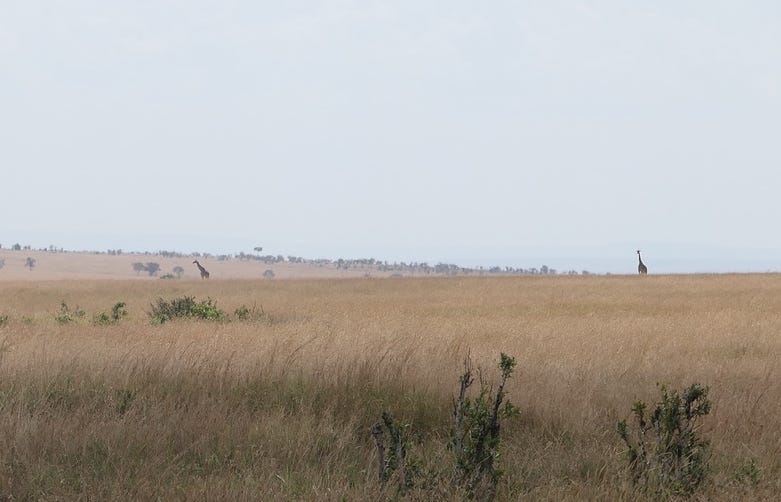
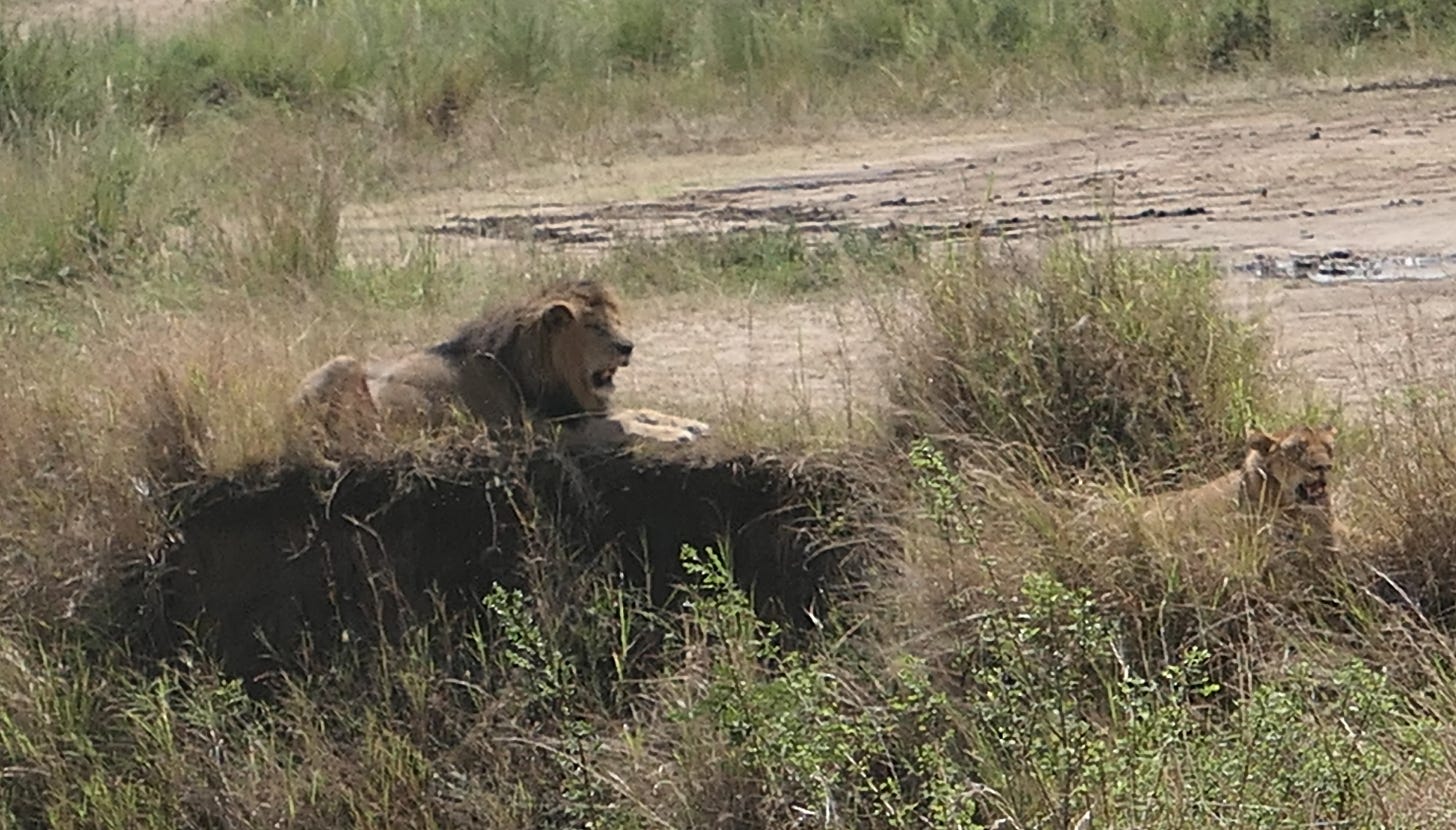
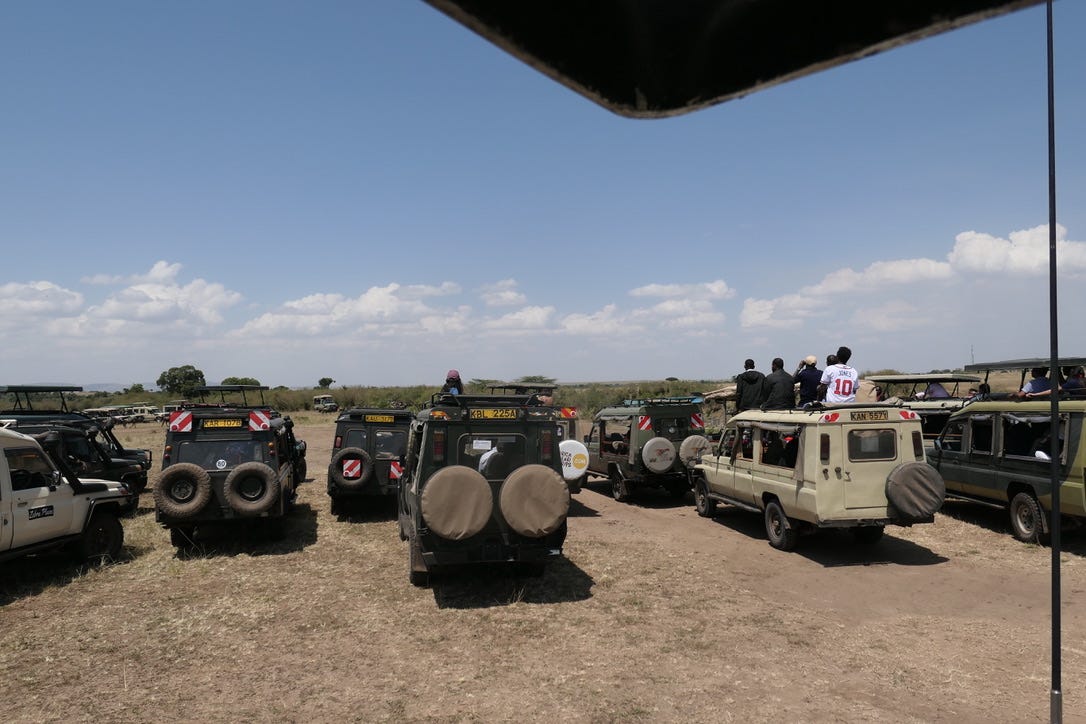




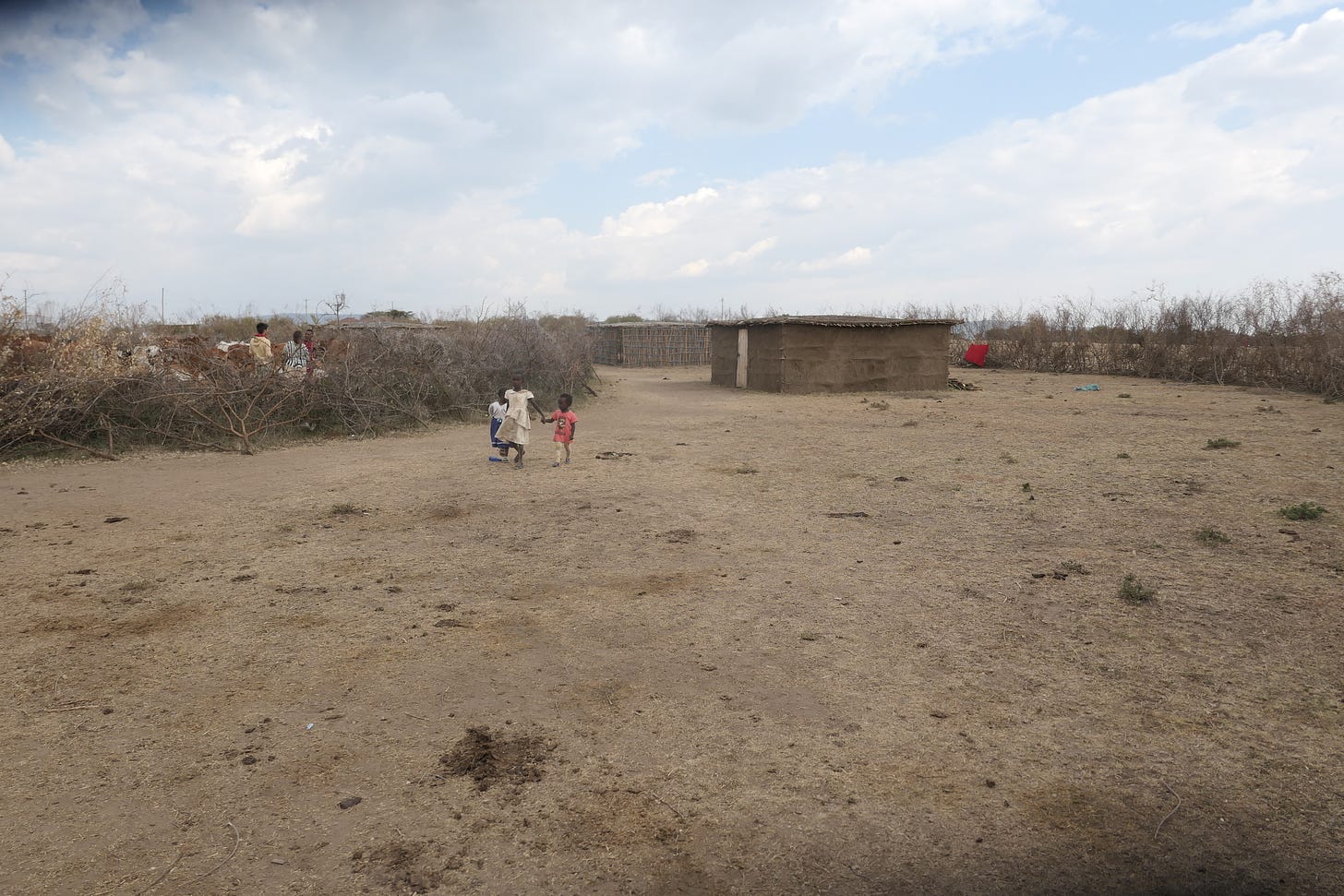


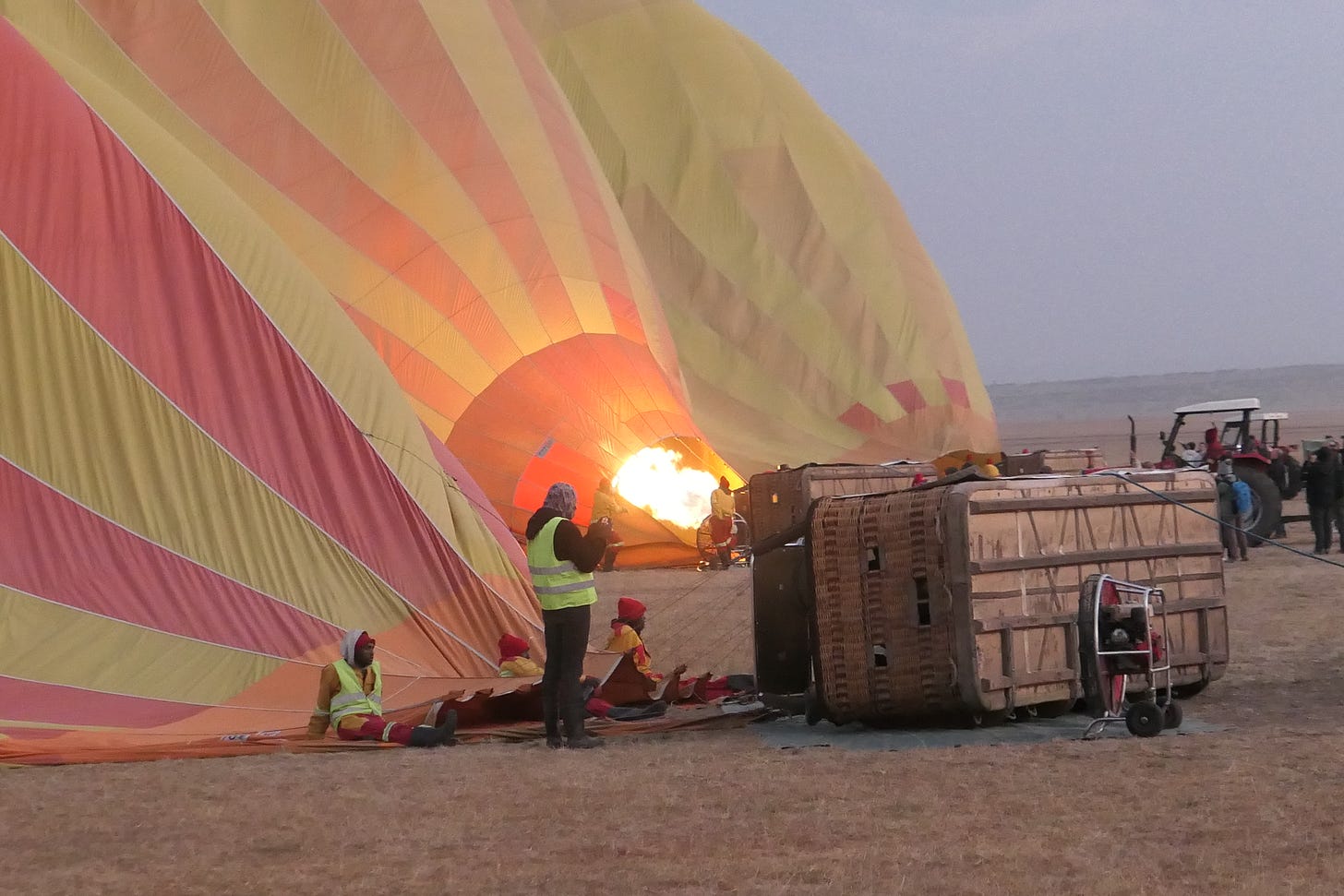
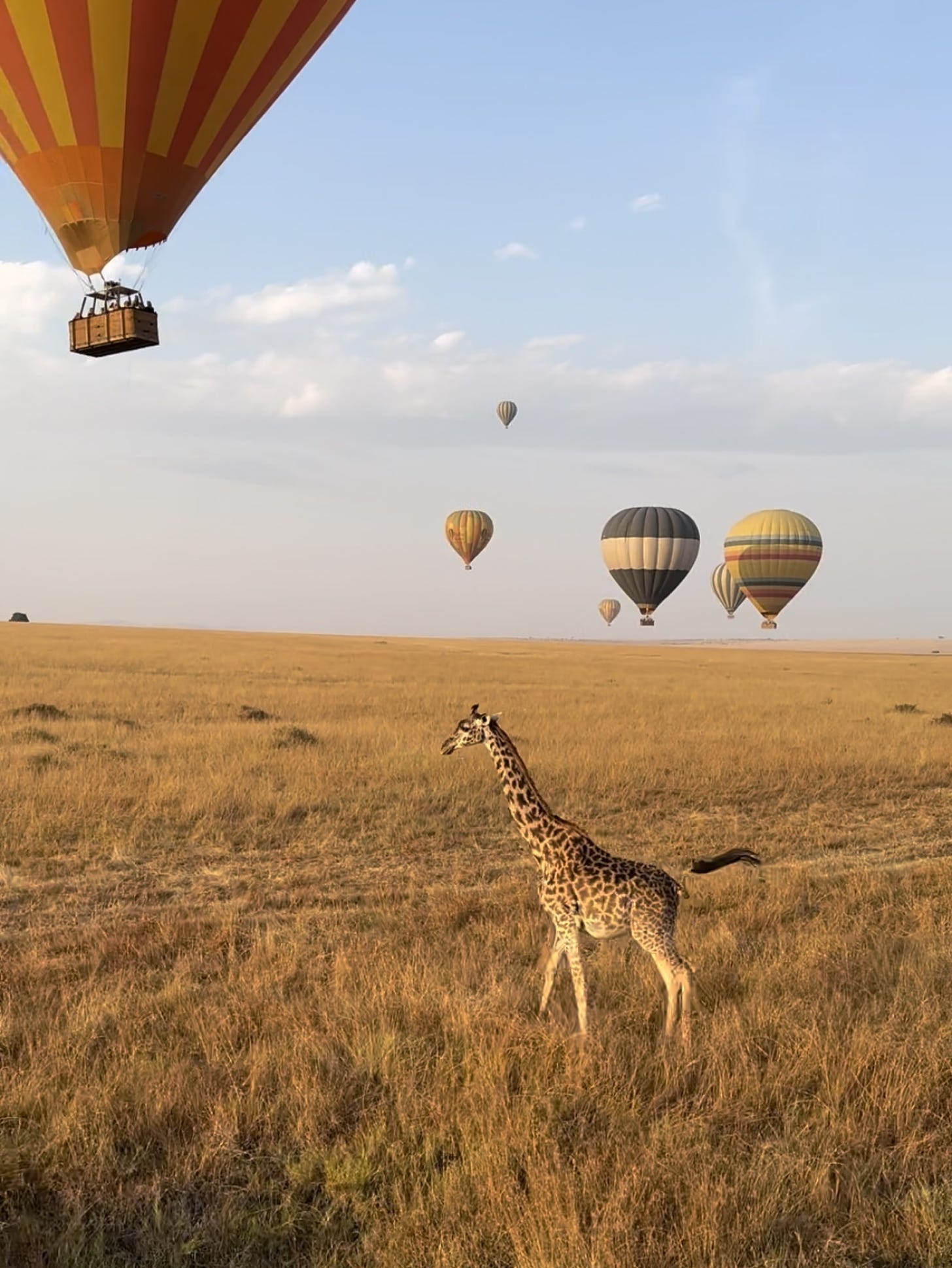

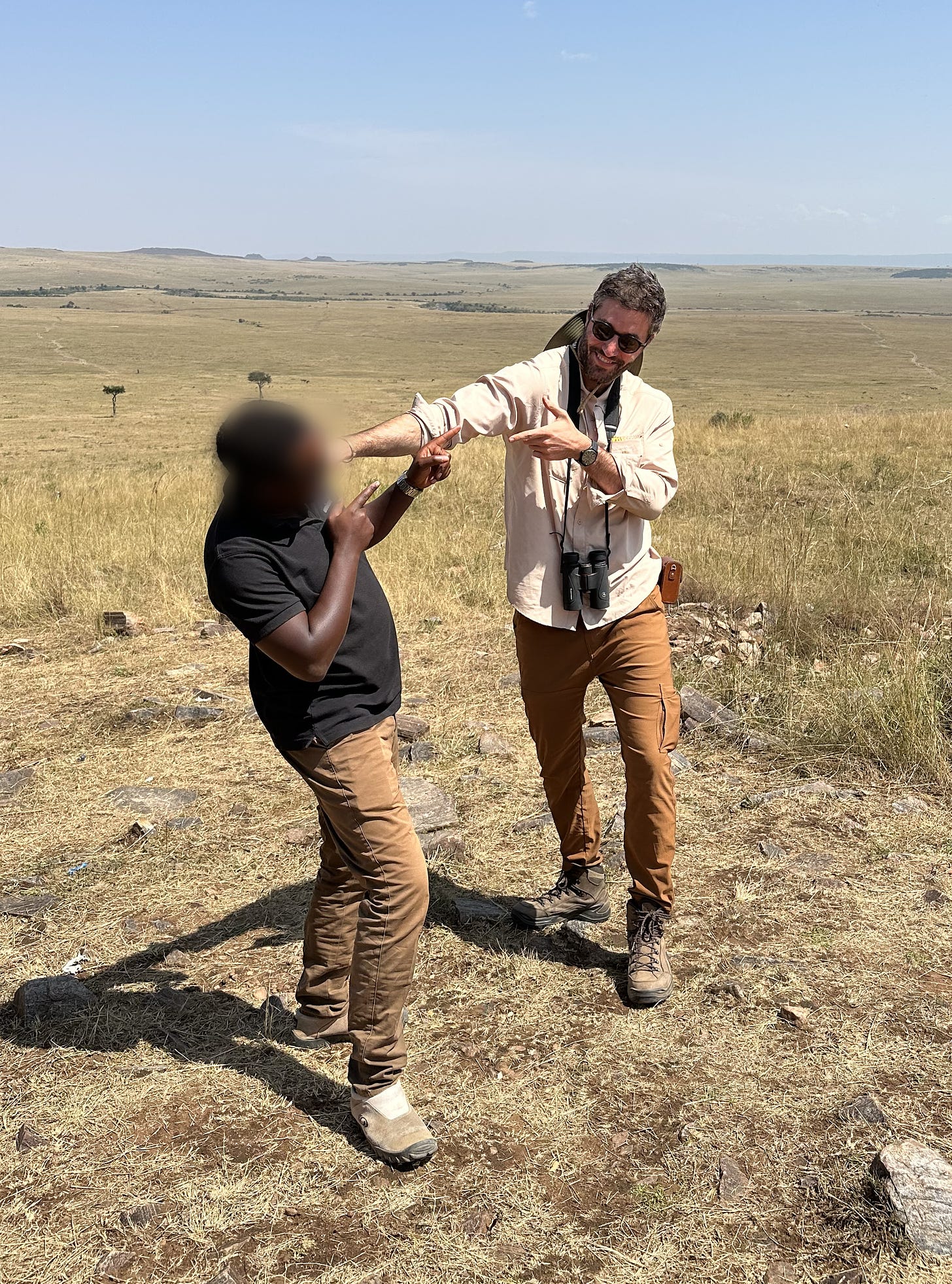
What a bonkers economy. Thanks for not sugarcoating another vivid albeit slightly disturbing installment. Those kids. That belt. The croc. Capitalism. Hooray, capitalism.
Fascinating..and disturbing. Confirms why I’ve never wanted to go on a safari. But oth it is a way for locals to make a (precarious) living. And offers protection for the animals. So what do I know..